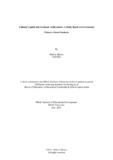| dc.contributor.advisor | Jahan, Israt | |
| dc.contributor.author | Murtaz, Maleha | |
| dc.date.accessioned | 2021-11-17T07:09:24Z | |
| dc.date.available | 2021-11-17T07:09:24Z | |
| dc.date.copyright | 2021 | |
| dc.date.issued | 2021-07 | |
| dc.identifier.other | ID 19357021 | |
| dc.identifier.uri | http://hdl.handle.net/10361/15623 | |
| dc.description | This thesis is submitted in partial fulfilment of the requirements for the degree of Masters of Science in Early Child Development, 2021. | en_US |
| dc.description | Cataloged from PDF version of thesis. | |
| dc.description | Includes bibliographical references (pages 67-72). | |
| dc.description.abstract | This paper explored the relation between cultural capital and academic achievement in a government primary school of Chittagong, Bangladesh. This is a mixed method research where 61 parents of grade 5 students were selected for survey by using cluster sampling method, and 10 parents of high achiever and achiever students were selected for key informant interviews by using purposive sampling technique. 15 hypotheses were tested depending on three major themes; parents’ education, parents’ communication and parents’ recreational behavior. For this analysis, Spearman Rank Correlation Coefficient was used to identify relationship between variables. This study found that in the setting of government primary school, parent’s education has no correlation with children’s academic achievement, but, at the same time, home based learning aid has moderate positive correlation with children’s academic success. Again, having someone in home who is involved with reading also has moderate positive correlation with children’s academic achievement. On a different note, Parents’ communication has small positive association with children’s academic success but some of the specific pattern of communication have moderate to high correlation. Encouraging children regularly, maintaining a comfortable relationship with them, story-telling and parents’ after school discussion with children have small positive correlation. In addition, accompanying children while they study, parents’ aspiration and expectations towards their children and set-rules by parents have large positive correlation. On the other hand, parents’ recreational behavior does not have any correlation with children’s academic achievement of government primary school student. | en_US |
| dc.description.statementofresponsibility | Maleha Murtaz | |
| dc.format.extent | 78 pages | |
| dc.language.iso | en | en_US |
| dc.publisher | Brac University | en_US |
| dc.rights | BRAC University thesis reports are protected by copyright. They may be viewed from this source for any purpose, but reproduction or distribution in any format is prohibited without written permission. | |
| dc.subject | Cultural capital | en_US |
| dc.subject | Educational attainment | en_US |
| dc.subject | Parents’ education | en_US |
| dc.subject | Parents’ communication | en_US |
| dc.subject | Parents’ recreational behavior | en_US |
| dc.subject.lcsh | Education, Elementary | |
| dc.subject.lcsh | Education -- Parent participation | |
| dc.title | Cultural capital and academic achievement: a study based on government primary school students | en_US |
| dc.type | Thesis | en_US |
| dc.contributor.department | Institute of Education Development, BRAC University | |
| dc.description.degree | M. Early Child Development | |

